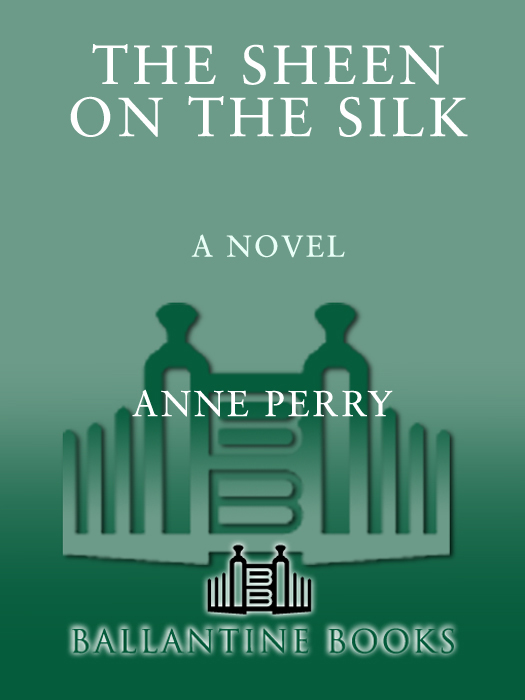
The Sheen on the Silk
A Novel
کتاب های مرتبط
- اطلاعات
- نقد و بررسی
- دیدگاه کاربران
نقد و بررسی

January 4, 2010
A battle between 13th-century religious factions forms the crux of this interesting departure for mystery novelist Perry (A Christmas Promise
). Disguised as a eunuch, physician Anna Zarides arrives in Byzantium to learn why her brother has been accused of murdering Besarion Comnenos, a man with significant aristocratic and political ties. As she ministers to the emperor Michael Palaeologus, the Orthodox bishop Constantine, the Medea-like Zoe Chrysaphes as well as Arab, Jewish, Italian, and Greek tradespeople, she learns of the bitter divisions between Orthodoxy (whose followers do not believe in the Holy Spirit) and the Latin rite (whose followers do), as well as a power struggle among the emperor, the king of Naples and the Two Sicilies, and the pope. As the danger, betrayals, and dead bodies mount, Perry conveys an earnest message about obsession, sacrifice, and faith at a dazzling crossroads of East and West civilizations.

January 1, 2010
A veteran of Victorian intrigue (Execution Dock, 2009, etc.) trains her sights on the late 13th century, when the powerful of Rome and Byzantium were just as unscrupulous and prone to violence.
Anna Zarides' brother Justinian has been pronounced guilty of murdering Bessarion Comnenos, who bitterly opposed the empire's union with Rome. Anna comes to Constantinople hoping to find evidence that will vindicate her twin, now exiled to Judea, and she protects herself in the vast, strange city by assuming the disguise of a eunuch. As the physician Anastasius Zarides, she steadily builds a thriving practice, assisted in large part by the support of Bessarion's magnetic, monstrous mother-in-law, Zoe Chrysaphes, whose"supreme skill" is poisoning her enemies by inventive means that anticipate Lucrezia Borgia. But for all her success in attracting patients and keeping her gender secret—even from Captain Giuliano Dandolo, the attractive Venetian aristocrat who soon wins her heart—Anna is agonizingly slow in working her way into the confidence of Bishop Constantine, Justinian's patron, who hides a thousand secrets. History, meanwhile, is moving far more rapidly than Anna. A series of revolving-door popes seek a rapprochement between East and West that amounts to a subjection of the Orthodox Church even as Charles of Anjou, King of Naples and the Two Sicilies, works tirelessly to promote another crusade against Byzantium. Perry, who's chosen her period (1273–82) with a canny eye for drama, makes this complex historical background both vivid and clear without any grandstanding (apart from an ill-judged walk-on by ten-year-old Dante Alighieri). She's less successful in creating characters capable of embodying both the salient historical conflicts and the illusion of independent lives of their own; they always behave exactly as you'd expect.
The history is consistently more surprising than the fiction in this grandly scaled epic of a turbulent period.
(COPYRIGHT (2010) KIRKUS REVIEWS/NIELSEN BUSINESS MEDIA, INC. ALL RIGHTS RESERVED.)

December 15, 2009
In the 13th century, one city stood between the Holy Roman Empire and the Holy Land: Constantinople. In a switch from her Victorian mysteries, Perry ("Buckingham Palace Gardens") weaves a complex and richly layered tale against this exotic backdrop. Anna, a young physician, comes to the city disguised as a eunuch to learn the truth behind the exile of her twin brother, who was implicated in a murder. No simple task, it takes years for her to work her way up through the many layers of Byzantine society until she is in a position to gain the truth. As her story unfolds, Constantinople struggles against internal and external forces in order to remain true to the Orthodox faith that set it at odds with Rome, all the while preparing for the next crusade. Like Judith Tarr in "The Eagle's Daughter", Perry brings to life a lesser-known time and place. Both the mystery and the love story are enjoyable, but it is the city itself that is the true star. VERDICT Fans of historical fiction and Perry's historical mysteries will enjoy this.Pamela O'Sullivan, SUNY Brockport
Copyright 2009 Library Journal, LLC Used with permission.

October 15, 2009
Perry, the author of both the popular Thomas and Charlotte Pitt mysteries, set in Victorian England, and a series of World War Iera thrillers, steps way outside her comfort zone in this new stand-alone. Its set in Constantinople in the late-thirteenth century, at the beginning of the Ottoman Empire. In the novel, a woman investigates the accusation that her now-exiled brother was involved in the murder of a prominent nobleman. But thats just the bare-bones story. The book, which spans about a decade, is set against a tumultuous backdrop of political and religious upheaval, not to mention a looming holy war (Rome is threatening another Crusade unless the Ottoman Empire aligns itself with the Roman Empire). Perry has constructed an elaborate plot involving conspiracy, revenge, and political machinations. Some of her fans may feel overwhelmed by the large cast of characters, labyrinthine plot, and unusual (for Perry, anyway) setting. On the other hand, readers whose tastes tend toward epic-sized mysteries set in a far-flung past will jump right in, captivated by the intriguing story and the authors seemingly effortless grasp of her historical setting. This could open up a whole new readership for the versatile Perry.(Reprinted with permission of Booklist, copyright 2009, American Library Association.)

























دیدگاه کاربران